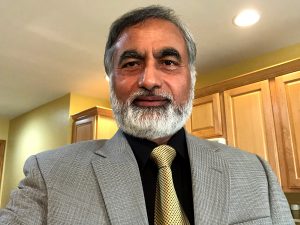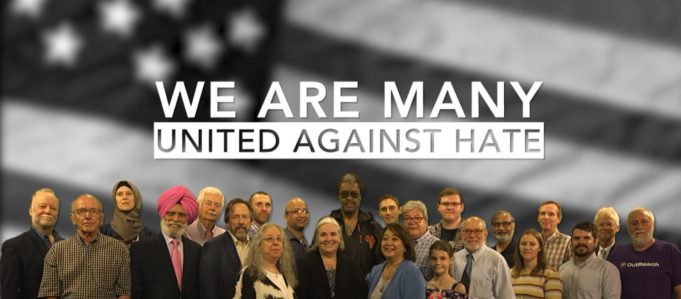“We’re seeing one mass shooting after another. Relentless scapegoating and demonizing of immigrants. Ugly racist incidents. Domestic terrorism by white supremacists,” says “We Are Many-United Against Hate” Founder and President Masood Akhtar in a statement. “Some politicians call for gun control. Others say no, the focus needs to be on mental health treatment. Still, others say no, something needs to be done about video games. They end up doing nothing. They are all hacking at branches, no one is striking at the roots,”
“We Are Many-United Against Hate” announced today that is challenging what they see as inaction of federal, state and local officials with its call for a 12-step program to battle the country’s addiction to hate and violence.

“Make no mistake, Congress and the president should take action dealing with gun violence, and so should the states, starting with measures that have overwhelming public support like universal criminal background checks, red flag laws, gun licensing, limiting the size of ammunition clips and raising the legal purchasing age to 21. Such steps are necessary but not sufficient. They do not get to the root of hate,” Akhtar says in a statement.
“We Are Many-United Against Hate” Executive Director Mike McCabe says that it’s important to recognize that the president didn’t start the fire. “He fans the flames, he pours gasoline on the blaze, he exploits it for his own political gain,” McCabe says in a press release. “But the fire was already burning before he got to the White House. It’s a big reason why he’s in the White House.”
“We Are Many-United Against Hate” outlined the following 12 steps to beating the addiction to hate and violence in America:
Step 1. Relieve economic stress. As former white supremacist leader and We Are Many-United Against Hate advisory board member Arno Michaelis points out, “violent extremist ideologies prey upon stresses like economic insecurity.” One way to create more economic stability and also address workers’ dissatisfaction with their jobs is to detach health insurance from employment and guarantee universal coverage. Too many people stay in jobs they can’t stand for fear of losing health insurance, a huge source of stress. Another way to create more economic security and free workers to pursue more satisfying employment is to replace traditional welfare programs with a universal basic income program. We Are Many-United Against Hate supports a pilot program testing the effectiveness of a basic income program.
Step 2. Reconnect with nature. Medicate less, recreate more. Make the Nature Rx movement into national policy and practice, with physicians prescribing time outdoors instead of so many painkillers. It’s shown to lower stress, blood pressure, heart rate and anxiety, and improve mood and mental health.
Step 3. Destigmatize and decriminalize mental health. Require that all health insurance covers mental health treatment as completely as treatment of physical illness. And come to terms with the reality that the most common response to mental illness in America is currently imprisonment. Mental health challenges need to be treated, not punished.
Step 4. Incarcerate less, educate more. America spends more per prisoner than per student. Wisconsin spends more of its state budget on prisons than on the entire state university system. Minnesota is imprisoning half as many people as Wisconsin, yet the two states have virtually identical crime rates, illustrating how mass incarceration has not made our country safer but has devoured resources that could be used instead to better fund education. Paying so much for failure makes it infinitely harder to afford investments in success. To reverse this, stop imprisoning nonviolent offenders.
Step 5. Demilitarize immigration. Repeal and replace ICE. Restore the federal Immigration and Naturalization Service with a mission acknowledging that openness to foreigners has been a defining characteristic of America and is essential to who we are as a nation, a sharp departure from the militarized and xenophobic nature of Immigration and Customs Enforcement (ICE).
Step 6. Administer a prescription-strength dose of democracy. Pathologies in our political system breed division, polarization and extreme partisanship that set a tone for all of society. Gerrymandering—the rearrangement of voting districts to favor the party in power—results in lopsided elections that produce a Congress and state legislatures full of ideologues and party loyalists who have little interest in working with the opposition. Redistricting done by an independent, nonpartisan authority can yield more cooperation and problem solving. Similarly, ranked-choice voting where voters rank all candidates in order of preference rather than casting just one vote for one candidate in a race discourages negative campaigning. When candidates likely need some second or third place votes as well as first-place votes to win, they’ll be careful about attacking their opponents because they need support from at least some of their opponents’ voters.
Step 7. Teach civics. Today’s schools focus on preparing young people to participate in the economy but not our democracy. Overemphasis of STEM (science, technology, engineering and math) education and near-total abandonment of civics instruction creates a school system concerned more with producing skilled workers than good citizens. How strange that in a country that boasts of being the world’s greatest democracy, democracy really isn’t taught. When the workings of government and how to responsibly consume media and distinguish between news and propaganda are not meaningfully taught, the population is left vulnerable to demagoguery and indoctrination. Merchants of hate feast on these conditions.
Step 8. Talk about religion and politics. It’s said that religion and politics are two things that should never be discussed in polite company. This is a rule that needs to be regularly broken. Avoiding any talk of religion and politics has only led to a lack of understanding of religion and politics and made us less capable of having civil conversations about difficult topics.
Step 9. Recommit to the First Amendment’s separation of church and state. The First Amendment protects the right to practice one’s own faith but also safeguards everyone from having another’s religion imposed on us. Freedom of religion and freedom from religious discrimination go hand in hand. That’s a core American value that we have strayed from.
Step 10. Dedicate to inclusive communities. Schools are being resegregated through voucher and charter programs. Rules aimed at preventing housing discrimination are being weakened. Such policies need to be reversed.
Step 11. Unite around a shared national purpose. When America is at its best, there is a strong sense of national purpose. It’s what put a man on the moon. At this time of growing division and hate in our society, as we try to wall ourselves off, it is no coincidence that it’s hard to put a finger on a common aim Americans are united in pursuing. Preventing the ecological, economic and social calamity sure to be brought on by global climate change could and should be such an aim. America should shoot for the moon and put our ingenuity to work making the United States the first nation on Earth fully powered by renewable energy.
Step 12. Practice common decency. We don’t all have to love each other. We don’t even have to like each other. But to break the addiction to hate and violence, we do have to follow the Golden Rule, treating others as we’d like to be treated ourselves… at home, in our neighborhoods, in the workplace, in politics.
“Hate and violence do not have a single cause. There is not a single branch to cut. We have to strike at the roots,” McCabe said in a statement. “One of the roots is economic insecurity and inequality. Some of the roots have to do with mental health challenges and make the need to overhaul both the health care and criminal justice systems painfully apparent. Some of the needed root striking involves personal soul searching, some involves changing what schools are doing, some requires fixing our democracy. Immigration reform is part of the answer. Protecting nature and getting outdoors more is another part of it. Responding to the climate emergency positively can be a powerful way to deal with growing hate and violence if we can unite behind this effort as a common national aim.”










